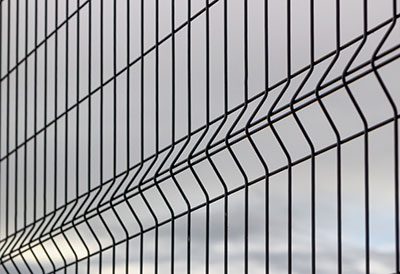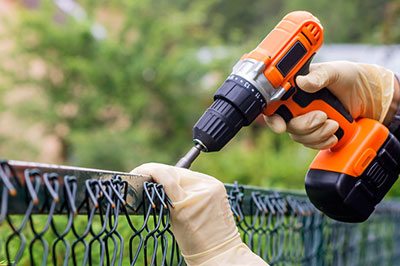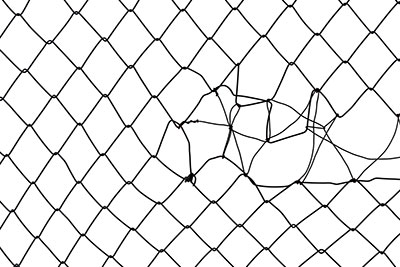Do you have a wire fence around your property? Wire fences are a great way to protect your home and property, but they also require regular maintenance if you want them to stand the test of time.
In this post, we’ll provide you with some tips on how to best maintain a wire fence to stay strong long into the future!
Whether it’s checking for issues regularly or following seasonal maintenance guidelines, our comprehensive guide will help ensure that your fence is in perfect condition for years to come.
Read on for more information about what steps you can take now!
Take away key points:
- Maintaining your fence regularly will keep your fence optimal and stop rust, corrosion, and similar damage to your fencing system
- You can apply even a protective coating (zinc coating and similar units) when necessary to keep your fence durable and sturdy. Applying different simple repairs will prevent you from paying extra money for your chain link fence systems
- If you need to repair some chain link fence parts, you need to consult your fencing contractor to ensure the best fencing standards for your needs
Table of Contents
- Why is regular maintenance of the wire fencing necessary?
- Keeping a wire fencing strong & maintaining tension
- Critical wire fencing steps to prevent corrosion and rust
- Can you use a wire brush to maintain chain link fences?
- Vital fence maintenance steps against sagging and misaligned wire fences
- Winter fence maintenance tips for wire fencing
- Best protection options for wooden fences
- Maintenance steps for vinyl fences
- FAQs
- Final verdict
You must keep your wire fencing optimal during the whole year, regardless of the harsh weather conditions. For this reason, you must learn the crucial steps for keeping your fencing materials secure and preparing your fence for the winter months.
Let’s see the procedure.
Why is regular maintenance of the wire fencing necessary?

Wire fencing is an excellent, cost-effective option for maintaining security and boundary demarcation, whether for commercial or residential properties. However, like all fencing materials, wire fences require regular maintenance to remain durable, long-lasting, and effective.
Maintenance steps of wire fencing are necessary to prevent damage caused by environmental factors such as excessive rainfall, heat, or winds. Ignoring signs of wear and tear, such as broken or loose wires, or bent or broken post lead to significant damage, affecting the fence’s effectiveness and increasing the overall cost of replacement.
By following proper maintenance practices such as clearing the fence of growing vegetation, trimming trees and bushes, inspecting for any signs of damage in the wire or posts, and repairing any damage immediately, you can keep your fence strong and durable for many years.
Keeping a wire fencing strong & maintaining tension
To maintain the strength and stability of wire fencing, it’s important to keep proper tension. To do that, follow these tips:
– Regularly check for damage, like bent posts or broken wires, and fix them immediately to prevent further issues.
– Ensure proper installation with deep-set posts that are secured and anchored.
– Use durable, high-quality materials for the fence and tensioning components.
– Keep the fence taut by checking and adjusting tension as needed, especially with changes in temperature or weather.
– Add fence braces or more tensioning components if necessary.
– Avoid plant growth around the fence to prevent damage or added weight.
– Keep the fence clean to prevent debris and rust that can weaken it over time for normal wear and tear.
These are the regular steps to keep your wire fencing optimal, but below we will explain them in more detail, for different fencing categories.
1. Maintaining a chain link fence: The full procedure
Maintaining your chain link fence doesn’t have to be difficult. By following these steps, your fence can stay looking great for years to come:
– Eliminate dirt and mud by washing away the grime with soapy water.
– Apply rust protection to prevent further rusting.
– Regularly clean your fence with borax and water solution.
– Avoid growing plants on or near the fence that may cause damage to the structure.
– Repair any damages in the fencing by removing the bent section and replacing it with a new one.
Remember, hiring professionals for fence repair can save you time and effort, and ensure the longevity of your fence’s lifespan. With these tips and tricks, your chain link fence can look brand new again for years to come.
2. Woven wire fencing maintenance
Woven wire fencing is a popular choice among property owners due to its reliability and durability. Unlike wooden fences, wire fences are less likely to be damaged by weather conditions, particularly rain. The tight weave in the knotted mesh provides added reinforcement to the fence.
However, this does not mean that neglecting fence maintenance is an option. To keep the fence in good condition throughout the year, regular inspections should be conducted.
It’s important to watch out for issues such as vines that can reduce the fence’s effectiveness, snowfall that can weigh it down, and debris that can collect at the base of the fence.
When replacing a section of the fence, or during installation, ensure that the fence is not over-tightened as this can straighten the crimps in the wire. This will make it less able to withstand weather changes. Keeping the crimps intact is important for the fence’s durability.
3. Barbed wire fencing maintenance
Barbed wire fences are commonly used to enclose large animals in expansive pastures due to their cost-effectiveness and ease of installation. They require fewer fence posts than other wire options. These fences also serve as a clear deterrent for intruders, while preventing livestock from chewing on the fence.
However, barbed wire fences require general maintenance, such as installing fence stays to prevent sagging, repairing any broken wires, and ensuring proper installation with proper bracing and tension.
Regular inspections and general maintenance, including removing debris from the barbs, repairing any damage, and trimming plant life growing around the fence, are also necessary to ensure its longevity.
4. Electric wire fencing maintenance
Electric fence maintenance can be straightforward, but it requires attention to electrical distribution, sagging wires, and climbing plants.
During inspections, use a voltage tester to spot any issues with wiring or shorts, indicated by dips in voltage. If voltage is low in certain areas, check for broken insulators or wires, or install more grounding rods.
Sagging wires can affect the electrical currents running through them, so re-tension them if necessary. Be aware of potential issues caused by birds and climbing vines, which can cause deformation of the wires, and clear any debris to avoid these issues.
Also, ensure the wires are properly stretched to ensure the optimal fence line for animal protection. You can also ask a fencing professional for more advice and tips.
Critical wire fencing steps to prevent corrosion and rust
Wire fencing is susceptible to rust and corrosion due to exposure to harsh weather conditions. To make your wire fencing durable and stronger, consider following these basic maintenance steps:
– Choose the appropriate fencing material, such as galvanized steel or vinyl-coated wire with rust and corrosion resistance. They will also protect your fence from harmful UV rays.
– Keep the fencing dry by ensuring proper drainage and avoiding water sources near the fence.
– Protect the fencing with a coating such as paint, powder coating, zinc coating, or aluminum-based coatings for proper care.
– Engage in regular cleaning to prevent debris and dirt accumulation, to prevent rust or corrosion.
– Treat rust promptly using rust converters or prevent rust with wire brushes and apply rust inhibitors for quick repairs.
– Apply oil or lubricant to the fencing to protect against rust and corrosion in the entire section exposed to salt or other corrosive substances. You’ll prevent costly issues.
Can you use a wire brush to maintain chain link fences?

Yes, wire brushes are often used in maintaining wire fencing and chain link fencing products. For example, to remove rust from a metal fence (chain link fencing), you can use a wire brush to scrub it away before applying a rust inhibitor primer.
Additionally, in cleaning chain link fences, a wire brush comes in handy in getting rid of dirt or rust buildup. Winter wire fence maintenance also involves using a wire brush to scrub off any rust spots that may have formed on the fencing material of the chain link fencing systems.
Therefore, a wire brush is an essential tool when it comes to wire fencing maintenance tips.
Vital fence maintenance steps against sagging and misaligned wire fences
Wire fencing can sag or become misaligned over time due to various reasons such as weather, wind, or animal pressure.
Here are some tips to prevent wire fencing from further sagging or becoming misaligned:
– Use high-quality wooden or metal posts that are correctly anchored in the ground to install a stable framework for the wire fence.
– Install a tension wire at the bottom and top of the fence to prevent sagging.
– Regularly inspect and maintain the fence wires for wear and tear, and immediately replace any damaged wires, posts, or clips.
– Make sure the fence is correctly installed, and the wires are tightly stretched between posts to avoid sagging.
– Choose a high-quality and durable wire that is resistant to rust and corrosion to prolong the life of the fence.
– Add additional support, such as a strand of electric wire or a rail fence, to reduce animal pressure if necessary.
Winter fence maintenance tips for wire fencing
Wire fence lines are a popular choice for many homeowners due to their durability and affordability. But, they still require maintenance to stay in good condition.
Here are some winter fence maintenance tips for wire fences:
– Check for loose or broken wires: Winter weather can cause wires to become loose or break. Be sure to check for any damage and make repairs as needed for your fence type.
– Clear snow and ice: Heavy snow and ice can weigh down your fence, causing wires to sag or break. Clearing snow and ice from your fence after a storm will help prevent damage.
– Avoid using de-icing chemicals: Chemicals used to melt ice and snow can damage your fence. Instead, use sand or sawdust to create traction in icy areas.
– Keep an eye out for moisture: Moisture can cause rust and other damage to your fence. Make sure your fence is properly drained and avoid sprinklers or other water sources near the fence.
With these winter maintenance tips, your wire fence will stay strong and secure all season long.
Best protection options for wooden fences
Steps for the Best Protection of your Wooden Fence:
– Choose the right materials: Select high-quality materials that are resistant to weathering, and wood rot, such as cedar or redwood for the wood fence.
– Prepare the fence: Before installation of the wooden fence, make sure the wood is clean, dry, and free of knots. Apply a wood protective coating before installing the wood fence.
– Stain or paint the fence: Protect the wood fence and enhance its appearance by applying a finish, such as a stain or paint, that contains UV blockers and mildewcides. Reapply the finish every few years.
– Install the fence properly: Follow the instructions carefully when installing the wood fence, ensuring that the posts are set securely in the ground, and the rails are level.
– Keep the fence clean: Regularly clean the fence with soap and water to prevent dirt, grime, and mildew from accumulating on the wood.
Maintenance steps for vinyl fences

Here are some important maintenance tips for your vinyl fence:
– Regular cleaning is crucial for your vinyl fence. You can rinse it with a garden hose or use a gentle bleach-based cleaner with a soft cloth to remove any dirt, dust, or pollen buildup.
– Always keep an eye out for mildew and remove it promptly to avoid causing damage to your vinyl fence.
– Annual inspections are important to assess the overall condition of your vinyl fence line and to make note of any repairs that may be needed on the entire fence.
– If you live in an area with extreme weather conditions, it’s best to check for hazards and clear any debris that may cause damage to your fence.
FAQs
How long does a wired fence last?
If you have a new chain link fence will last between 25 and 30 years if you maintain it properly.
How do you make a wire fence look good?
You can paint your chain link fence or similar type of fence in a bald color to give it more life. However, you can also hang marbles, gems, and similar accessories to make it more stylish. You might also have a creative gate to make it more attractive.
How to keep your wire fence strong and maintain tension?
Follow the steps below:
– Installing a sturdy framework
– Using tension wire
– Proper maintenance
– Proper installation
– Choosing the right type of wire
– Reducing animal pressure
Is welded wire fence good for chickens?
Yes, the welded wire is the safest option for chicken coop and run.
Final verdict
Taking a little extra time and effort to maintain your fence is always worth it. Paying closer attention to the materials you choose for your fence line will ensure that you get the most for your money in the long run.
Not only will a well-maintained fence last longer, but it can also provide improved protection against rust and resistance to cold weather conditions.
Maintaining your fence regularly is critical if you want to extend its life, and make sure it works at its best all year round!
